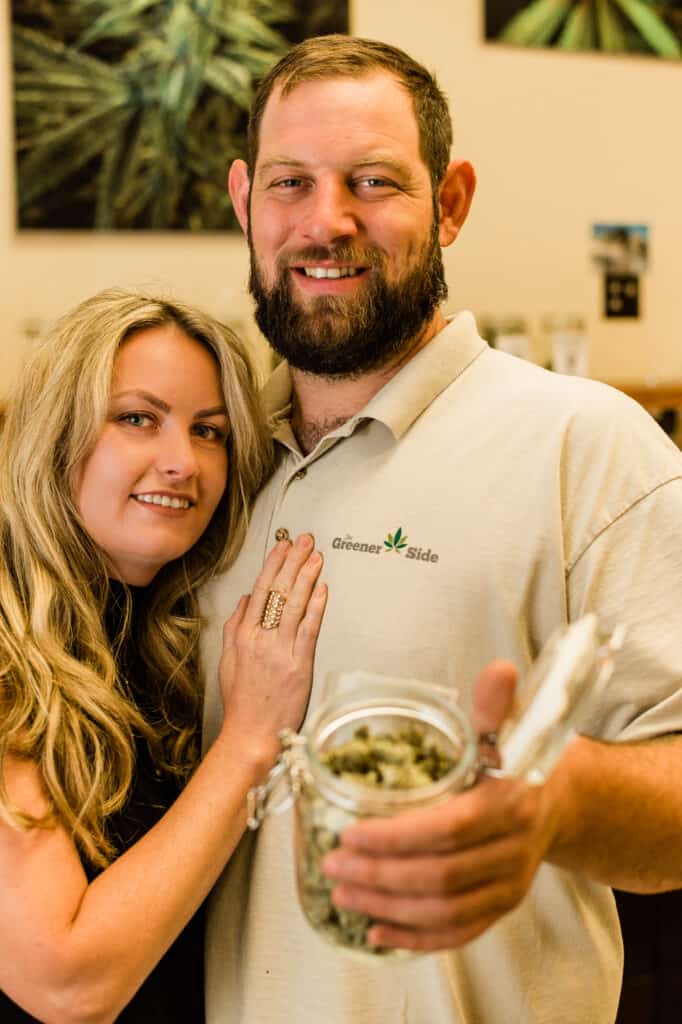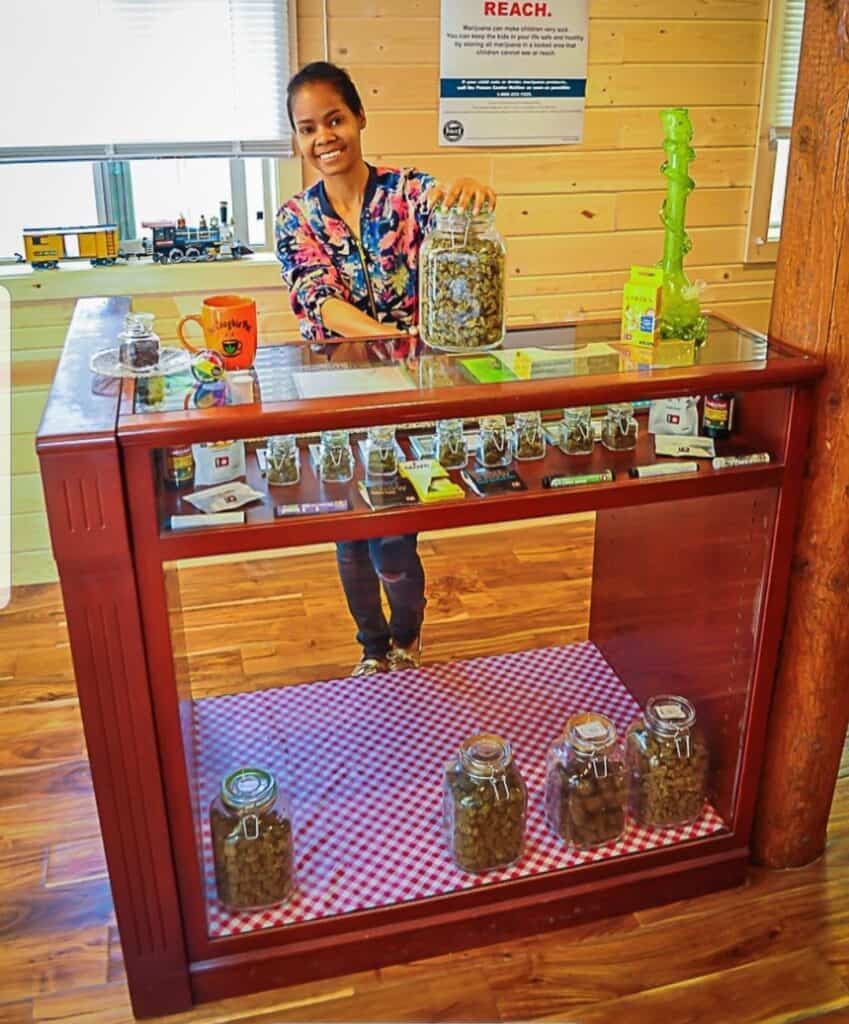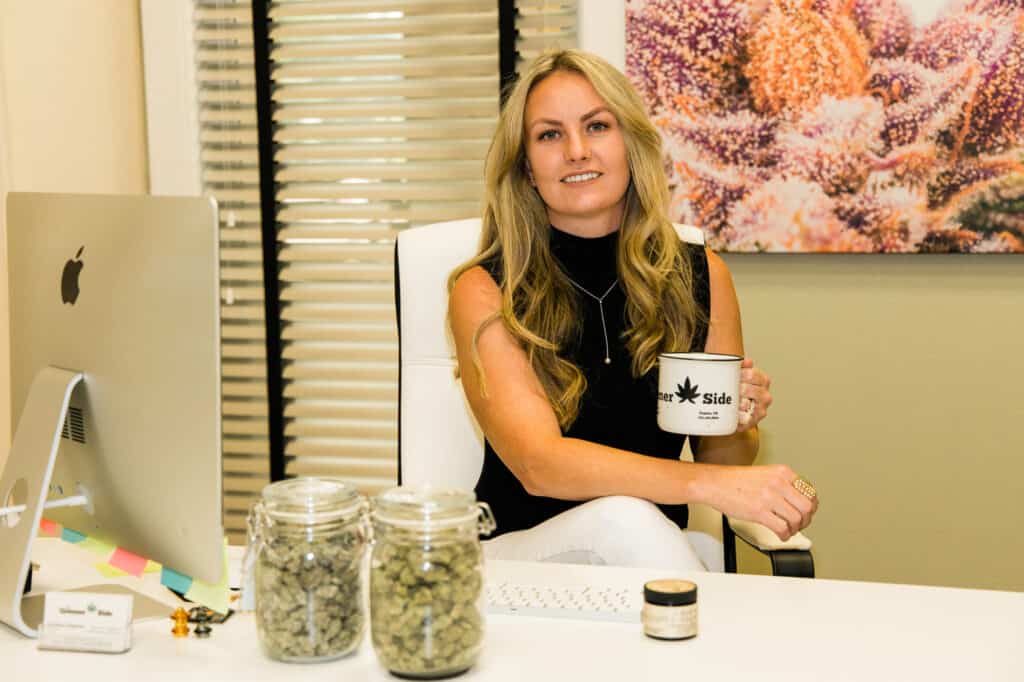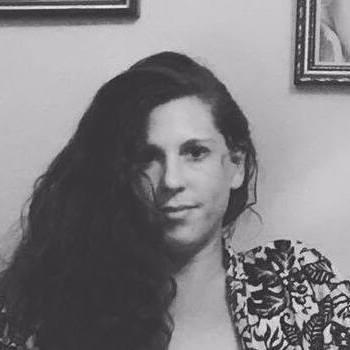As the legal cannabis market expands, it’s the industry heavyweights that often draw the most attention. But in the world of cannabis retail, sometimes the smallest businesses make the biggest impact. From their gold standard customer service to frontline cannabis advocacy work, most mom-and-pop dispensaries punch well above their weight.
The Greener Side is Eugene’s oldest OLCC-licensed dispensary, and their experience is one of their greatest assets. Since owners Joseph and Chelsea Hopkins received Oregon’s first dispensary license, they’ve dealt with everything from government raids to forest fires. “My husband and I decided to move up to Eugene and model a safe access point here in the Willamette Valley in 2013,” says Chelsea Hopkins.

In the early days of legalization, safe access points were places medical card holders could come to find products from different growers. Costs were low and focus was on getting plant medicine to the people who needed it.
“It looked a lot like what a dispensary looks like today, but it was much more patient focused,” she says. But at the time, safe access was not the federal government’s concern. “At that time there was serious federal tension–a lot of raiding was happening on medical farms. We really had to step in as advocates for medical cannabis, and highlight the fact that the federal government was targeting medical facilities.”
The federal raid on the Hopkins’ store and home took place only two weeks after they opened, but it didn’t succeed in shutting them down. Instead, the community rallied around the new business.
“It actually backfired,” Hopkins says. “People were upset that tax dollars were being used to arrest us. We had a lot of community members writing letters to the editor and calling local politicians, letting people know they didn’t agree with the way things were going.”
Their sustained commitment to the medicinal aspects of cannabis frames their work in terms of the health of the community. “We’re not just a business. We’re looking at the whole–what’s going to benefit everybody beyond being just a dispensary. We want to do what’s best for everyone.” This goes beyond just Eugene. Hopkins lobbies in Washington on behalf of the cannabis industry and sits on the board of the Oregon Retailers of Cannabis Association. “We’re here for the movement as well as the industry,” says Hopkins. The business may only have one location, but the impact of their work ripples throughout the state.

At the The Coughie Pot in Eastern Oregon, owners Portia Mittons and Lori Duckworth run their business with a similar sense of purpose. “It’s my life’s calling,” says Duckworth. She has been a cannabis advocate for decades, and has dealt with her fair share of pushback. “I’ve been through the gamut,” she says. But becoming a partner at The Coughie Pot meant dealing with a bit of a culture shock. “I’m from Southern Oregon–weed country. There it’s just a way of life.” Coming into The Coughie Pot meant trading weed country for cowboy country. “In Eastern Oregon you have a lot of cowboys, goat ropers, and Republicans. They’re not as accepting of the lifestyle.” Before they could even open, the dispensary’s original owners had to work to overturn their town’s cannabis ban to allow them to operate.
But for Duckworth that is also part of Sumpter’s appeal. Instead of preaching to the stoner choir, she sees her role as bringing medicine to places where people are still uneasy with the idea of cannabis use. In Oregon’s cowboy country, a place where politics can differ dramatically from the coast, legalization is still a contentious issue. Some eastern counties have gone as far as suggesting moving Idaho’s border west to incorporate their populations into what they see as a more like-minded state. Oregon’s 2020 drug decriminalization law is cited as one of the main reasons they want to make the change. “People say, ‘We don’t want to be like Portland or Seattle,” Duckworth explains. She hears the same thing in conversations with people in Idaho, where she focuses much of her advocacy work. “But I believe if I’m pure of heart the message will come across. I really just felt that I was being called here.”
The dispensary is a place where people who are curious can go to learn more about cannabis without being scrutinized or judged. “One of the things we hear about our little shop is that we’re really personable. We know all of our customers on a first name basis.” The community growing up around the dispensary goes beyond their small town; often people drive for miles to come to their store. “We have people that would rather drive into the small shop in the hills where they don’t feel watched as much. We hear how scared they are just for choosing a safer medical alternative.”
The work isn’t always glamorous–small business owners generally can’t afford to stay out of day-to-day operations. When an employee calls in sick, the owners have to step up, or as she puts it, “When you can’t fill it you work it.”
While Duckworth spoke about her business, she simultaneously worked the floor, periodically pausing the conversation to attend to her customers. But it’s this level of involvement that builds trust with the surrounding community. People know that they can count on the owners of The Coughie Pot to answer their questions and listen to their individual needs. Whatever their reasons for walking through the doors initially, the warm atmosphere keeps people coming back. One of Duckworth’s favorite customers is a sheriff from a nearby town, who’s never in a hurry and always has a story to tell.
Duckworth is proud to report that they are Oregon’s only log cabin dispensary . “It’s stepping back in time, but with all of the goodies of today.” Their square footage is tiny, but it suits them. Instead of overwhelming customers with different options, they use precious space to stock the goods they know their community will use. “We know what our customers like. When we order something we order it for our customers. Everything is tailored for our own clientele.”
Up in Washington, the divide between the weed friendly coast and the more conservative interior may be less stark, but small town dispensary owners looking to normalize cannabis culture still have their work cut out for them. Sapphire Cannabis is a dispensary in Sprague, Washington owned by Dan and Trisha Nelson. Trisha is a registered nurse and Dan is a general contractor, or as he puts it, “contractor by day, and cannabis aficionado by night.” Juggling a small business and two full time jobs keeps them on their toes, but the dispensary is their dream, and they are determined to find a way to make it work.
Dan Nelson has always been passionate about the plant, and when legal cannabis began to gather steam he started a YouTube channel called Washington Weed Reviews to get to know the business. He originally wanted to be a grower, but had trouble with the license. When a friend offered him an opportunity to open a dispensary he didn’t hesitate.
“It’s real tiny,” he says. “We’re pretty much at the bottom of the chain if you ask me.” But like The Coughie Pot, this small dispensary has become a hub for a large community of people in the region looking to ease into cannabis culture. “70% of my town voted yes for cannabis, but a lot of people don’t want to talk about it up front,” he says. “That’s what’s good about our little store. You can come in there; we don’t shout you out loud and proud. You can come in without worrying that someone’s going to know. We want to make sure our customers are taken care of across the board.”
Reducing the stigma is often a matter of changing one mind at a time. At Sapphire Cannabis, it happens every day. “Our budtenders are really happy people,” says Nelson. “People are pretty afraid, but we allow you to stand in our store all day long if you want to, and you don’t have to buy a damn thing. You can ask as many questions as you have. With several customers what’s bringing them back is their ability to socialize– it’s up to us to make sure they feel comfortable.”
As legalization gains more ground nationwide, it’s easy to take access for granted. But at mom-and-pop dispensaries, business is still based on the values shared by the people who fought on the cannabis front lines for decades. Cannabis culture is about more than a bottom line, and they see every customer who walks through their door as someone to bring into the fold. As Chelsea Hopkins of The Greener Side puts it, “It’s very personal to us. We help people from all walks of life–that’s the coolest part. First and foremost we have to remember those people are why we’re here today.”





